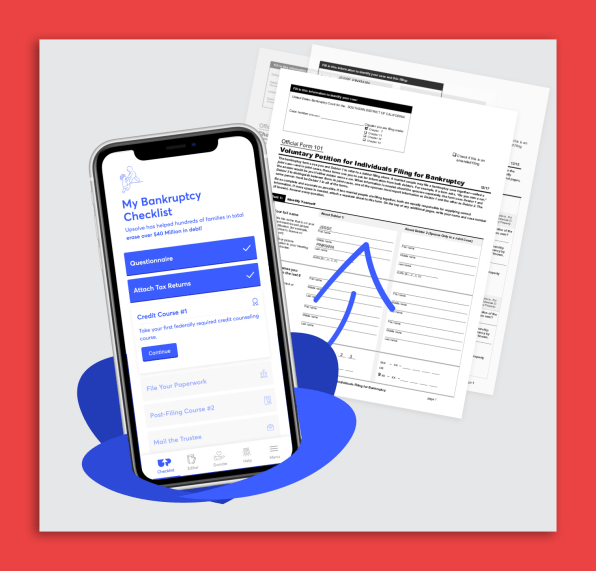People are starting to declare bankruptcy from coronavirus—but it’s often impossible to do while distancing
As unemployment claims soar because of the coronavirus—especially in the service industry, and in other jobs where working remotely is impossible—Upsolve, a startup nonprofit that offers a free online tool to help people declare bankruptcy, is beginning to see its first users citing the coronavirus as the reason for their visit.
The nonprofit, which designed a Turbo Tax-like tool for bankruptcy in response to the fact that the people who most need bankruptcy can’t afford a lawyer or navigate the complex process on their own, is expecting filings to swell over time. “During the economic recession of 2008, bankruptcy filings increased by 2-3 times, and based on the number of people claiming unemployment right now, I think that we should see bankruptcy filings at around the same rate,” says Upsolve cofounder and CEO Rohan Pavuluri. “That would be my guess, especially because of the level of consumer debt that already exists in our economy.” In the week ending on March 21, a record 3.28 million Americans filed for unemployment benefits.
While each case varies, it often makes sense for people to file a bankruptcy claim at the lowest point of their financial problems, so it’s likely that filings will steeply grow later in the year. “People should oftentimes wait until they think their financial situation is going to get better instead of filing only to fall into more debt afterward,” Pavuluri says. “We would predict that it wouldn’t be in the next couple of months, but around the end of Q2 or beginning of Q3, the rate of bankruptcy filings should increase.”

An additional challenge: Most courts only allow online filing when someone has a lawyer, so people who are trying to file on their own using Upsolve have to take an extra trip into public at a time when everyone should be sheltering in place to slow the spread of the disease. “The bankruptcy system discriminates against poor people by only allowing people who can afford lawyers to file electronically,” he says. “During normal times, that’s an additional barrier because it requires people who are poor to go ahead and print out their forms and mail them or hand-deliver them, which can cost up to a hundred bucks because of all the filings. . . . But that’s a problem that’s made even more acute during COVID because you are putting yourself in physical harm if you are needing to go to FedEx and needing to hand-deliver the forms to the bankruptcy court.”
It’s one more way that the bankruptcy system is hardest to navigate for those who are most in need of it. “At every step of the way, the bankruptcy process, in addition to so many areas of poverty law, discriminates against people who can’t afford lawyers,” says Pavuluri. “The forms are particularly complicated. The filing procedures are particularly complicated. And [this country has] designed the system around the assumption that people have lawyers, by and large because this system has been built by lawyers.”
One Upsolve user, a single mother, told the startup that she’s been struggling to find a place to affordably print out the dozens of pages of forms now that her local library has closed; she’s also trying to juggle taking care of kids that she suspects may have the virus and trying to afford to feed them. Pavuluri says that a small number of courts are beginning to allow online filing, and he’s hopeful that will grow. Courts are also beginning to hold hearings by phone rather than in person.
“Bankruptcy was built for addressing unexpected financial shocks, and COVID-19 is the definition of an unexpected financial shock,” he says. “The unfortunate thing is that there are some barriers in place—lack of electronic filing, namely—that really harm consumers when they need bankruptcy the most. We hope that something good can come out of COVID-19 in the sense that courts can realize the injustice in how they’re treating poor people today.”
(13)



